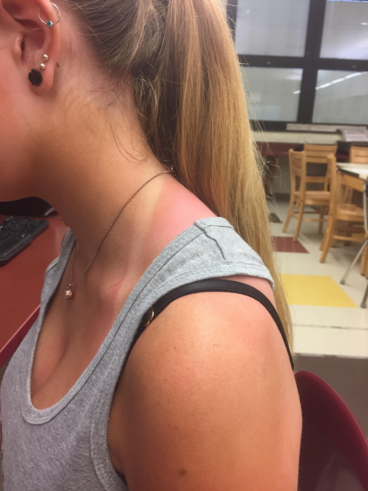Should students sun or spray tan?

Photo Credit: Julia Blando
A mixture of Olivia Lorenzo’s sunburn, self tanner, and natural skin.
June 15, 2016
Summer is right around the corner, and many are seeking a bronzed look for their complexion. However, acquiring the “perfect” color, in the traditional sense, is not the healthiest option.
According to the Skin Cancer foundation, human skin gets darker in the sun due to harmful UV rays, which damages the skin cells. The foundation recommends wearing sunscreen to protect from skin cancer, but this also thwarts attempts to become tan.
“How am I supposed to get tan if I wear sunscreen?” Isabella San Lorenzo, junior, said.
Sun tanning can lead to skin cancer and premature aging. People with lighter skin naturally have a higher risk of attaining skin cancer, because their skin has less pigmentation to protect them from the sun. However, anyone can develop skin cancer, regardless of the shade of their skin.
“If you’re getting enough sun to get a tan, then you’re getting too much,” says Dr. David J. Leffell, professor of dermatology and surgery at the Yale School of Medicine.
Huffpost Healthy Post says that if a person does not apply sunscreen to uncovered parts of their skin every single day, the chance of acquiring melanoma doubles.
In this day and age, just about everyone in America is at least vaguely aware of the dangers of the sun, which is why many are turning to an easier solution: the perfect sun kissed look, conveniently packed in a bottle.
“I just rubbed it all over my body and stood in the shower for like 2 hours,” Olivia Lorenzo, sophomore, said. “Obviously I made a mistake that can’t be fixed.”
Self-tanner and spray tans are typically labeled as safe, but they do have some negatives as well.
The main problems with fake tans is they are often not applied properly, which leads to the user inhaling dihydroxyacetone, or DHA, which can increase free radical formation. This can lead to cell damage and cancer, according to Huffpost Healthy Post.
“People are calling me orange, and it gets everywhere. Not a good situation. I would not recommend a fake tan because it’s causing me more stress than my math grade,” Lorenzo said. “It failed because now I’m orange.”
No tan is completely safe, so natural color is the way to go.
“Healthy skin trumps skin damage any day,” Taylor Kubota, Men’s Journal writer, said.



